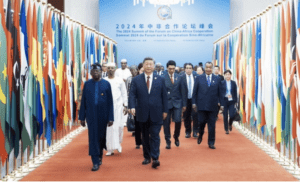By Alexandra Marie Charlotte Stahl
This year, all eyes are on the 2024 Summer Olympics in Paris. It is one of the world’s most famous spectacles, featuring over 10,000 athletes from 204 countries competing in 300 events across 28 sports. The event captures global attention, with over 10 million tickets sold and a global television audience reaching billions.
Beyond the athletic competition, the rivalry among cities competing to host the Games is at least equally intense. While cities chase the honor of hosting for various reasons, the potential for significant economic gains remains a dominant motivation.
Cities are motivated to host the Olympic Games to boost their economy through tourism and investment, develop long-term infrastructure, gain global recognition, create jobs, foster civic pride, and implement legacy projects that might benefit the community long after the event.
However, a growing number of economists argue that the benefits of hosting the games are exaggerated and nonexistent at best, as they have left many host countries with large debts and maintenance liabilities. These analysts suggest that Olympic committees reform the bidding and selection process to incentivize realistic budget planning, increase transparency, and promote sustainable investments that serve the public interest. The Paris 2024 Olympics present a unique case study to evaluate whether recent reforms have rendered hosting more advantageous.
Economic Prospects and Challenges
Historically, industrialized nations and host cities carry the organizational costs, with some financial assistance from the International Olympic Committee (IOC).
The latest estimates put the Paris Olympics and Paralympics budget for facilities and operations at 8.9 billion euros, or about $9.7 billion. That would make these Olympics less expensive than London ($16.8 billion), Rio ($23.6 billion), and Tokyo (over $13.7 billion). Recent discourse among economists has increasingly highlighted the dubious nature of the economic windfalls from hosting the Games.
Financial Commitments and Infrastructure Investments
The IOC mandates that host cities must provide at least 40,000 available hotel rooms, often necessitating extensive construction projects. Infrastructure expenditures for the Olympics can vary dramatically, from $5 billion to upwards of $50 billion. The budget for the Paris 2024 Olympics is set at $4.7 billion, with an additional $4.7 billion allocated for infrastructure, predominantly financed by the private sector.
Short-Term Economic Boost
According to INSEE, the French National Statistics Institute, the Olympic Games are expected to impact the French economy positively in the short term. The institute forecasts that the Olympic Games will boost France’s economic growth in 2024, contributing 0.3 percentage points to quarterly growth in the third quarter due to ticket sales, TV rights, and increased tourism. However, INSEE also cautions that the volatile political situation in France could pose risks to these forecasts.
The hospitality industry in Paris is expected to see significant benefits from the influx of tourists. According to Oxford Economics, hotel prices during the event are expected to surge, with tourists facing a nearly 200% increase in the tourist tax per night. The average hotel price for three to five-star accommodations has escalated by 41-64% above the yearly average. Expected hotel occupancy rates were slow to increase at the start of this year, likely due to the inflated prices. However, the latest data from STR shows occupancy rates are up in Paris and across the Île-de-France region as of the end of June. However, these elevated costs and the associated disruptions could discourage travel before the Olympic games, negatively impacting local businesses reliant on consistent tourist traffic.
Long-Term Economic Consequences
While investments in the hospitality sector can theoretically yield long-term benefits, the substantial outlays required to meet the peak demands of the Games may result in overcapacity post-event. A notable example is the 1994 Winter Olympics in Lillehammer, Norway, where 40% of the town’s full-service hotels went bankrupt post-Games. Similarly, the 2004 Summer Olympics in Athens saw extensive investments in hospitality and infrastructure, but these did not translate into sustained economic benefits. Many of the hotels and venues built for the Games struggled to find use afterward, contributing to the financial strain on the city and exacerbating Greece’s economic crisis. The overcapacity and maintenance costs of these facilities added to the long-term debt burden of Athens.
Also problematic are so-called white elephants, or expensive facilities with limited post-Olympics use because of their size or specialized nature. These often impose costs for years to come. For example, Sydney’s Olympic stadium costs the city $30 million annually. Beijing’s famous “Bird’s Nest” stadium cost $460 million to build, requires $10 million a year to maintain, and sat unused primarily after the 2008 games until the city used it again to host the 2022 Winter Games. Almost all the facilities built for the 2004 Athens Olympics, whose costs contributed to the Greek debt crisis, are now derelict.
Economists argue that we must consider the opportunity costs of public spending that could have been spent on other priorities. Servicing the debt left over after hosting the games can burden public budgets for decades. It took Montreal until 2006 to pay off the last of its debt from the 1976 Games, while Greece’s billions in Olympics debt helped bankrupt the country.
However, an accurate financial accounting of Olympic expenditures in various cities is complex to find for multiple reasons. It can be challenging to separate spending on Olympic building projects from planned infrastructure improvements that might not directly relate to the games. Moreover, concerns about cost overruns or corruption may prompt officials to limit the release of accurate data.
Paris’ Mixed-Use Development Strategy
The Olympic Village, designed by 40 architects under a master plan by Dominique Perrault, will transform into 2,800 apartments post-Games. More than a third of these will be rented out to lower-income residents and students, while the remainder will be available on the private market. This approach balances taxpayer expectations for affordable housing with private investors’ profitability demands.
Key areas like Saint-Denis and Le Bourget will benefit from urban redevelopment and enhanced public transportation. These projects are designed to provide long-term benefits, ensuring the investments made for the Olympics continue to serve the community well after the Games finish.
Conclusion
The economic ramifications of hosting the Olympic Games are complex and multifaceted. While there are potential benefits in terms of global visibility and infrastructure development, the financial risks and long-term economic burdens are substantial. The 2024 Paris Olympics will serve as a critical test case to determine whether recent reforms can lead to a more balanced and sustainable financial outcome for host cities.
Featured image courtesy of Unsplash.com




